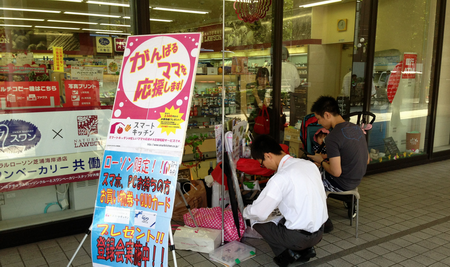
A relatively recent service being offered by Japanese convenience stores is local home delivery.
The delivery services of major chains including Seven-Eleven and FamilyMart are increasingly catering to the needs of working mothers and the elderly.
Following is a look at the home delivery boom:
How did home delivery services begin?
The first convenience store chain to offer home deliveries was am/pm Japan, in 1996. Patrons could phone in or fax orders for items from the chain’s catalog.
Starting in the late 1990s, most chains, including Seven-Eleven, Lawson and FamilyMart, were angling to field delivery orders placed through their websites.
What are recent delivery service trends?
In January, Lawson established Smart Kitchen, an online delivery firm offering some 23,000 items especially geared toward working women — particularly mothers with small children.
Ming Li, a public relations officer at Lawson Inc., said Smart Kitchen has joined hands with Yahoo Japan Corp. to tap the search giant’s savvy in website development to attract more patrons.
“We also aim to use the knowledge we already have with Natural Lawson, which (is particularly geared toward) young women and has a lineup of healthy food items like yogurt and salads,” he said, adding that fifty thousand customers have already signed up with Smart Kitchen, which hopes to be in the black by fiscal 2014.
FamilyMart last December acquired Senior Life Create, a “bento” (boxed lunch) delivery service for seniors. The company also combines delivery of meals with sundry items sold at its FamilyMart stores. Deliveries are free in the Kanto region.
Seven-Eleven meanwhile has been expanding its Seven Meal delivery service. In July, it started using Toyota Coms, compact electric vehicles equipped with special insulated boxes to keep hot meals warm and frozen food cold.
Deliveries at most Seven-Eleven stores are also free.
What items do online delivery services offer?
Everything from meals, snacks, soft drinks, alcoholic beverages and other daily necessities ranging from disposable diapers and toilet paper to pet food.
Lawson’s Smart Kitchen service offers 10-minute cooking kits that have proved helpful to time-pressed working mothers who have to pick up children at day care centers and quickly go home to prepare meals.
Smart Kitchen offers an original lineup of 300 private-brand items.
How do convenience store’s delivery services stack up against those of supermarkets and consumer cooperatives?
Mayumi Ito, a public relations official at Seven-Eleven Japan Co., noted the chain emphasizes the community-based nature of its stores and their proximity to customers.
With its Seven Meal bento service for seniors, for example, the chain underscores that deliveries are made by the employees of their local stores, she said.
“The customers can easily order things like toilet paper or mineral water together with a meal when they drop in at the store, and have them delivered to their doors later,” Ito said.
“I think the customers feel comfortable when they see a familiar face deliver items from a store they usually shop at.”
FamilyMart delivery staff also check in on elderly customers to see how they are getting along, providing another community service.
Do home delivery services pose problems?
Tomomi Nagai, senior analyst at Toray Corporate Business Research Inc., noted that delivery services have trouble making a profit unless they sell items in bulk.
“During deliveries, stores are also operating short-handed,” she said.
Ito of Seven-Eleven said each of the chain’s 12,000 stores engaged in deliveries have a free hand in how to cope with them.
“It’s essential for us as a convenience store chain to attract customers who will stay with us in the future,” she said.
What does the future hold for home delivery?
The services will continue to expand, centering on major convenience stores,” said Nagai of Toray.
There are now some fifty thousand convenience stores nationwide and more continue to open, pushing the market toward saturation and compelling the chains to get ever more creative in their services.
“Convenience stores need to stock their shelves with different items or exploit new customer segments, particularly seniors who don’t want to shop for and carry home large items like rice, mineral water and alcohol,” said Nagai.
“Working mothers in their 20s and 30s don’t have time to shop at stores, so demand from this target group should grow in the future,” said Li of Lawson.
Ito of Seven-Eleven said there is still room to tap new customers, as the chain learned via its deliveries that there is further demand potential, including among people caring for the elderly.







